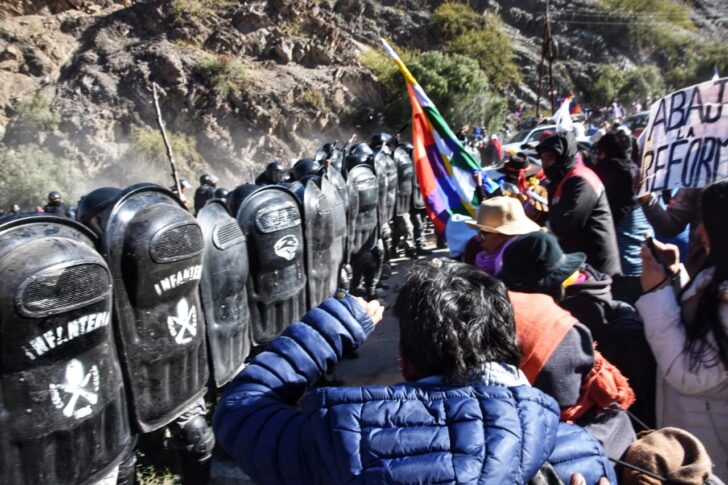Back in March, teachers from the Argentine northern province of Jujuy began to strike demanding higher salaries, which rank amongst the lowest in the country. Municipal, healthcare and transportation workers also joined these demonstrations.
At the end of May, the governor began a process of constitutional reform including restrictions to the right to protest, hindering the rights of indigenous communities and hampering the protection of natural resources. Even though the constitutional convention should have been in session for ninety days, this term was shortened to three weeks and excluded several social sectors from the debate, such as indigenous communities which were requesting the provincial government to fulfil its obligation to enforce mechanisms for a free, prior and informed consent.
The provincial government resorted to violence against several sectors of the society of Jujuy that went out to the streets of different cities of the province to protest against the contents and proceedings of the constitutional reform. Indigenous communities manifested by blocking the roads. On Saturday, June 17th, the infantry of the police force of Jujuy cracked down on the protests shooting rubber bullets and firing tear-gas canisters. The repression injured dozens of people and many others — including legislators, workers of the press and even some minors— were arbitrarily arrested. Organizations and communication media condemned violent acts by plainclothes police officers. Protests continued and a brutal police operation blocked protestors from approaching the provincial congress, where the new constitution was passed.
Arbitrariness and violence were the main features of all police operations during this past week. Among those injured, a man was hit by a gas grenade on his head. Police shot rubber bullets against protesters from buildings, in a sniper-like fashion. Unidentified trucks transported masked officials who arrested people on the streets and broke into and entered houses. At least 56 people were arrested and dozens were injured.
At the same time, the provincial government organized a media campaign to stigmatize protesters. The Governor himself spread fake news in an attempt to appear as a victim of violence organized “outside” Jujuy (in Buenos Aires or Bolivia).
Hindering the exercise of rights by way of a constitutional reform and blocking protesters are political decisions of the government of Jujuy, which seeks to gather tools to silence the voice of those against extractive industries -particularly but not exclusively lithium- seeking to exploit indigenous land. The provincial government also wants to strengthen a restrictive approach towards the right of association and assembly in an attempt to violently reduce social conflict.
How we advocate for the right to protest
Together with other organizations, we sent a letter to the constitutional convention expressing concern for the restrictions to the enjoyment of human rights proposed by the reform. Once approved, we made a new joint presentation demanding the suspension of the reform and the creation of new channels of dialogue.
During the repression, we requested the provincial judicial branch to protect protestors. Together with Andhes, an organization based in Jujuy, we sought collective and preventive habeas corpus relief to protect the right of free circulation and the right to protest of indigenous communities. At the same time, we filed a habeas corpus petition requesting federal law enforcement agencies not to repress protestors on national roads. We also sent information and requested the intervention of the Inter-American Commission on Human Rights, we held a conversation with the United Nations High Commissioner for Human Rights, we requested the urgent action of the Special Rapporteur on the rights of Indigenous Peoples and we shared information with the Special Rapporteur on the rights to freedom of peaceful assembly and of association. The IACHR issued a press release on Tuesday, June 20th and the UN High Commissioner for Human Rights issued a communication on the matter on Wednesday, June 21st.
(Photography: Johana Arce / Sisas Medio)

